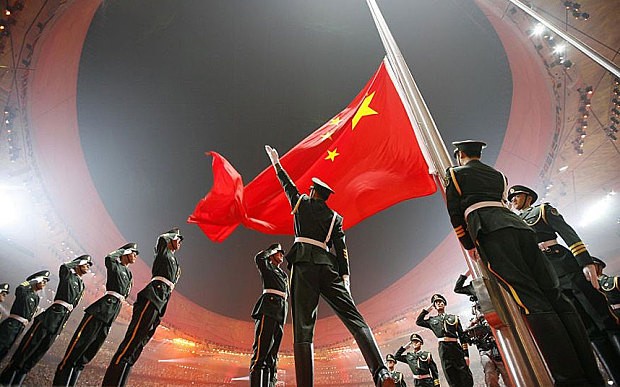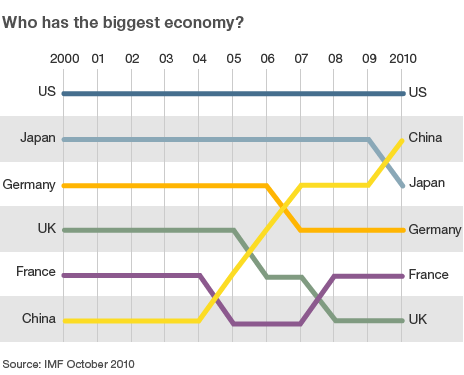China overtakes USA as world s largest economy
Post on: 9 Октябрь, 2015 No Comment

In a world history moment, C hina has just pushed off the United States as the world’s top economy, according to new data from the International Monetary Fund.
The measurement, known as Purchasing Power Parity, shows that Chinese consumers are able to buy more shoes, Starbucks and cars than Americans can with their money — a clear sign of China’s rising wealth and superpower status.
It’s been expected for a long time, said Yuen Pau Woo, Distinguished East Asia Fellow, Asia Pacific Foundation of Canada in Vancouver.
“If we haven’t already understood how important China is to Canada, I sure hope this statistic wakes us up, and prompts an even more focused reorientation of our political, economic and diplomatic energies to a building of durable relations with China.”
“China is not an option for the Canadian economy, it is an imperative .
Hong Kong — Wiki Commons
Breaking the news was the Financial Times in the UK, who confirmed the story in a phone call with the Vancouver Observer. The paper’s economics editor blogged about it Tuesday.
“Now it is official. In 2014, the International Monetary Fund estimates the size of the US economy was $17.4 trillion and the size of China’s economy was $17.6 trillion,” wrote Chris Giles.
The data is available on the IMF’s website. when queried.
China’s middle class: 100s of millions strong
Woo said the purchasing power statistic shows the massive growth of China’s middle class, now numbering several hundreds of millions of citizens.
The effect of that, can be witnessed in many ways.
One hundred million trips were taken by Chinese people outside the country last year — one hundred million! said Woo.
Many common western products, are also now owned by Chinese firms.
Olive oil from Italy, or Weetabix cereal from Britain, or your favourite Swedish automobile Volvo — are all owned by Chinese companies.
Likewise, the demand for luxury goods as skyrocketed. As the world witnessed the Hong Kong protests in recent times, Woo said:
There was a record breaking sale of fine wines in Hong Kong, purchased mostly by [China’s] mainland aficionados .
Tianjin Skyline 2009 — Wiki Commons
Still, China’s rise hides important realities. Woo said Chinese incomes are still lower than the average American’s salary. One hundred million Chinese, mostly in rural areas, still live in poverty.
“We shouldn’t conjure up a picture of China being like America for the average Chinese person.
Impact of China’s rise on Canada
Yet, across Canada, China’s growing role in our lives cannot be underestimated.

In B.C. said Woo, most new forestry jobs are created because of China.
And for those in the green sector:
“If you’re in the renewable energy business, China invests more in this sector than U.S. or other western country.
Canada’s exports to China also doubled between 2008 and 2013, while those to the U.S. haven’t even returned to 2007 levels following the economic crash, he added.
A trip to Shanghai says it all — its skyline in every direction downtown is full of hundreds of shiny new towers, making it as impressive as New York to many observers.
In 2010, China overtook the U.S. as the largest consumer of energy in the world — creating more demand for Alberta’s oil sands’ bitumen, and the resultant pipeline, tankers and rail loads.
Then in September, it was also announced that China is now the world’s largest producer and consumer of cars.
China now has more than 150 cities with populations in excess of one million each. 41 of China’s cities are larger than Toronto’s population of 2.5 million.
Unlike what might be commonly believed, China’s wealthy are not massively driving up the cost of homes in Vancouver, said the B.C. Real Estate Association.
It was just a matter of when, not if that China would over take the U.S. In terms of the Vancouver housing market. it’s not still not significantly driven by offshore investment, said the association’s chief economist Cameron Muir on Wednesday.
Many wealthy Chinese though, do play a key role in the metro Vancouver’s luxury-class housing market, he clarified.
China is still Canada’s second largest trading partner after the U.S. according to the federal government.
[<a href=//storify.com/VanObserver/world-reacts-to-china-s-rise target=_blank>View the story World reacts to China’s rise on Storify</a>]














